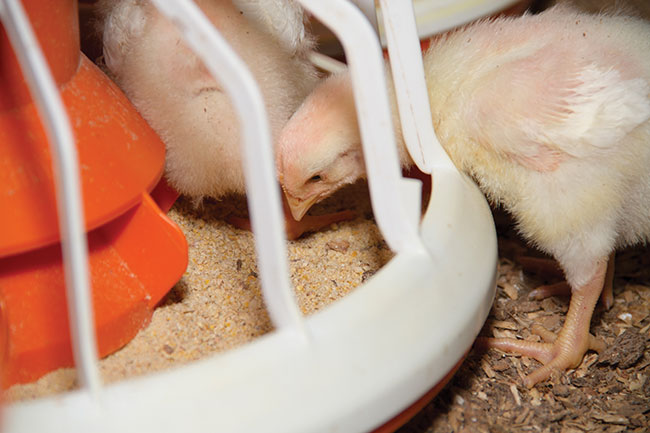
Pellets with punch
By Lisa McLean
Features Health Nutrition and FeedNew poultry feed treatment uses essential oils to control necrotic enteritis.
 Two research scientists from Agriculture and Agri-Food Canada developed a feed treatment that uses essential oils to control necrotic enteritis.
Two research scientists from Agriculture and Agri-Food Canada developed a feed treatment that uses essential oils to control necrotic enteritis. Canadian chicken and turkey producers won’t have to wait much longer for a product that controls a problematic poultry disease as effectively as preventative antibiotics. Thanks to a decade of research that led to product development and successful on-farm trials using essential oils, researchers expect their feed treatment for controlling necrotic enteritis (NE) will soon be on the market.
NE is a devastating poultry disease that starts in a bird’s gut and often leads to death in young birds. Drs. Qi Wang and Joshua Gong, research scientists with Agriculture and Agri-Food Canada (AAFC), have used microencapsulated essential oil products to control NE and to study its impact on chicken growth performance. They recently put the product to the test on broiler farms.
“Development of viable alternatives to antibiotics to control NE disease has become highly significant to the poultry industry,” Wang says. “For this project, our original plan was to conduct six trials on Ontario farms to see how the product performed on real farms.”
The researchers successfully completed five on-farm trials before the research was halted due to the COVID-19 pandemic. But during one of the trials the farm experienced an NE outbreak and the team was able to see their product in action.
“In this trial, we had two treatments – one higher dose and one lower dose – as well as a positive and negative control group. Both doses eliminated the outbreak,” Wang says. “We saw improved gut health and improved growth performance – it was what we had hoped for.”
Wang says the product, which uses materials that are already safe for consumption, involves a unique process of spray-drying the essential oil into a powder form to encapsulate and protect the essential oil. From there, the oil powder is added to feed and undergoes a pelleting process. The product is in the pre-commercialization stage with Gowans Feed Consulting.
“Microencapsulation of the product protects the essential oil so it can improve the amount being delivered to the bird’s gut,” Gong says.
“It is more effective to control pathogens and improve gut health and the on-farm trials provide proof of concept that our product works.”
Gong notes the finished product will come at a higher price than antibiotic-treated feed, but it is comparable to other antibiotic alternatives on the market.
“There are already several sectors waiting for this product, including organic producers and those who produce antibiotic-free chickens for the premium market,” Gong says.
As a next step, Wang says their commercialization partner is working to access the technology required to produce the product on a commercial scale. She says the spray dryer, which is essential to manufacturing the product, is a popular technology in other fields such as foods and pharmaceuticals, but so far accessing one for commercial use has been challenging.
“We knew incorporating the essential oils into feed would make it easier for producers to use on farms, but there may be a delay in getting the spray-drying process set up,” Wang says. “With some additional work we may be able to deliver the product in liquid form through drinking water in the short term. Our goal is to get this to market as soon as possible.”
This research is funded by the Canadian Poultry Research Council as part of the Poultry Science Cluster which is supported by Agriculture and Agri-Food Canada as part of the Canadian Agricultural Partnership, a federal-provincial-territorial initiative. Additional funding was provided by Chicken Farmers of Saskatchewan, and in-kind support from L.E.L. farms and Gowans Feed Consulting.
Print this page